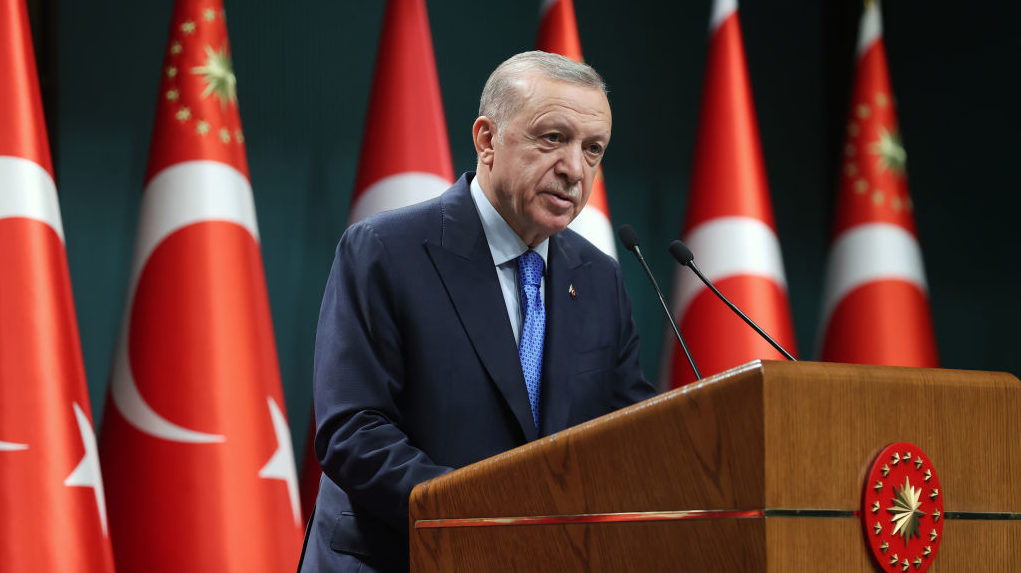With Attacks on Kurds, Erdogan Aims To Weaken Opposition Ahead of Election
Regional analysts view Turkish president’s threatened ground incursion as political ploy aimed at sowing division back home
Turkish President Recep Tayyip Erdogan has signaled that a ground incursion in northern Syria and Iraq may be on the table after Ankara launched a series of airstrikes on Kurdish bases in the two countries.
Erdogan has blamed Kurdish groups for a deadly bombing in Istanbul that took the lives of six people and wounded dozens more. For their part, Kurdish groups have denied any involvement in the blast. The female assailant who carried out the bombing is said to be of Syrian extraction and had entered Turkey through Afrin in northern Syria, according to Turkish media reports.
On Sunday, Turkey announced the launch of Operation Claw-Sword aimed against the positions of the Kurdistan Workers’ Party (PKK) in northern Iraq as well as at the Kurdish People’s Protection group (YPG) along the Syrian border.
Dozens were reported to have been killed in the ensuing Turkish air strikes on Syrian and Iraqi targets that took place over the weekend.
Erdogan warned that the military campaign could well involve ground forces.
However, regional experts believe that the uptick in Turkey-Kurdish tension is mainly a pretext aimed at boosting Erdogan’s chances of reelection.
Guney Yildiz, a London-based researcher, journalist and former think tank expert on Turkey, told The Media Line that the timing of the military campaign appears to be politically motivated.
“There’s an upcoming election for Erdogan [in June] and the Kurdish voters in Turkey are among the key constituents who will determine who will not be the next president,” Yildiz explained. “If the [Kurds in Turkey] vote for the opposition candidate then Erdogan is at a huge risk of not being elected.”
As soon as the state is fighting the Kurds, how can the opposition unite with the Kurdish party
Ahead of the pivotal vote, Erdogan has been pushing a very strong anti-Kurd policy aimed at sowing division in the Turkish opposition bloc and thereby strengthening his position, Yildiz said.
“When the Kurds in Turkey react to Turkish attacks in Syria, the opposition will most probably side with the government or support the incursion, and that may create divisions within the Turkish opposition or among Kurdish voters,” he explained, adding that the move also holds strategic significance for Turkey, which fears Kurdish independence.
The female assailant behind the Istanbul bombing was named by Turkish media as 23-year-old Ahlam Albashir. Although Ankara was quick to accuse her of being backed by Kurdish groups, other reports indicate instead that Albashir has links to the Turkish-backed Free Syrian Army.
“Other suspects linked to this woman turned out to be part of the Islamist Syrian opposition rather than Kurdish groups,” Yildiz affirmed. “From the first moment, the Turkish government was blaming the Kurds for being behind the attack but evidence circulating [shows] that it is difficult to deduce that.”
Dr. Hay Eytan Cohen Yanarocak, an expert on Turkey at the Jerusalem Institute for Strategy and Security and Tel Aviv University’s Moshe Dayan Center for Middle Eastern and African Studies, also believes that Erdogan is scapegoating the Kurds for political reasons.
“As soon as the state is fighting the Kurds, how can the opposition unite with the Kurdish party,” he said. “Even though the terrorist was a Syrian Arab – and not a Kurd – the Turkish government is still blaming the Kurds. This is why I believe that the blame is mostly political. As soon as he attacks the Kurds that greatly weakens his opposition,” he told The Media Line.
According to Yanarocak, Ankara currently is focused on attacking the Kobane area, which holds great symbolic value since this is where the Kurds fought against the Islamic State group.
To further complicate matters, Iran also has recently begun attacking positions in Iraq that are held by Kurdish groups. The Islamic Republic reportedly is seeking to divert attention away from the internal unrest brought about by months of widespread anti-government protests.
Whether or not Ankara decides to move forward with a ground incursion is dependent on the Russian and American response to the move, Yanarocak said, recalling that the United States relied heavily on Kurdish forces to defeat Islamic State jihadists in 2014.
Washington has so far urged de-escalation, while Moscow has called on Turkey to refrain from using excessive military force.
“If there will indeed be an incursion then it will happen similarly to previous ones and be limited in scope,” Yanarocak predicted. “It can’t last for a long time and therefore I do not believe that it will destabilize the region.”


